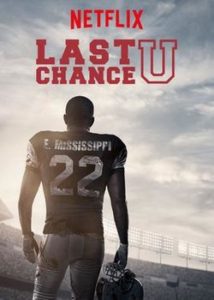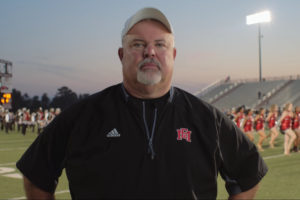The NFL playoffs are here, the FBS champions have been named, and The Marvelous Mrs. Maisel won two Golden Globes. All this reminded me I still need to share some of my thoughts on the Netflix series Last Chance U.

Last Chance U follows two seasons at Eastern Mississippi Community College (EMCC), which has become a dynasty in the Junior College football world. They are know for working with players who: 1) couldn't make it academically right out of high school in a four-year D1 program, and 2) athletes who were previously kicked out of a D1 program. The title of the series is a bit of a misnomer then because for many playing at EMCC isn't their last chance, it's their second or third chance. Perhaps the "last chance" refers to getting into a top four-year football program, but I suppose that's a bit too complicated. I must confess that I knew a bit about the "JuCo" system before this, but I didn't understand how common it is to move (back) up to top D1 bowl schools. For example, in this year's national title game two of the players on Georgia's roster came from a JuCo, and one for Alabama. I also was shocked by the resources and perks at such a small school, in a small and poor town, especially the fields and their accoutrements and the training facilities.
The series revolves around two adults, and then an array of interesting students and coaches who orbit around them during the season. The first is Brittany Wagner, a sunny academic coordinator who will literally chase players down to make sure they have a pencil to take into class. She is clearly the break out star of Season 1, and Season 2 shows her trying to figure out how to get out of Scooba, MS (population: 697). It's also clear that the other main adult, Buddy Stephens, was none too happy with his own negative portrayal in Season 1. And in Season 2 we never see Stephens or Wagner interact at all.
One of the things that upset Stephens when he watched "the documentary" (that is how he refers to it, but there are 14 episodes) is how much he swore. It is startling, as is some of his other language. The worst-- for viewers, but more significantly for the players themselves-- is when a season-ending brawl breaks out and he repeatedly refers to the players as thugs in its aftermath.
While most people are shocked by the display of a very aggressive form of masculinity (one line from the show is, "Blood makes the grass grow," and the players' peers are showed as homecoming queen contestants only in Season 1), it is race that stands out to me glaringly. The team Buddy refers to as thugs is dominated by African-American men. Buddy acts like he owns their bodies-- and he does certainly control them in all sorts of ways. His disparaging language when he interacts with his majority black team conjures up some not-so-nice parts of US history.
In Season 2 race becomes less the focus, as religion takes more of a center stage. Before and after each game/practice the players all recite the Lord's Prayer. One of the assistant coaches is also a preacher and he often uses scripture when teaching football. We even see a player be baptized.
This is not the first time a Scooba-based football coach has received major media attention, not all of it positive. In April 1984 the legendary sports writer Frank Deford wrote a cover story entitled, "The Toughest Coach There Ever Was." Much of what is described in this long article-- rumored to be the longest ever to appear in Sports Illustrated-- wouldn't fly today (helmet to helmet intentional hits being first on the list). And, yet, there are so many similarities between Robert Sullivan (aka "Bull Cyclone"), the focus of the Deford piece, and Buddy. Both white and overweight with potty mouths, terrible tempers, many coaching penalties, and a reputation for pushing the rules envelope. The biggest difference is that Sullivan remained revered by his players while Buddy is not well-liked, even if he gets results.
And the results don't come for some. The most tragic story (which isn't even covered in Season 2, but I suspect will have to be addressed at some point in Season 3, even though another school is the focus) is that of Isaiah Wright and his brother Camion Patrick (who also attended EMCC before transferring to Indiana). In September 2017 they were arrested for a July murder.
It's definitely worth watching this show, but beware that things are dark, and very dark at times. You learn, for example, about Wright eating out of trash cans, about serious domestic violence, and more. The crew does not shy away from reality, even if that reality is tough. Season 2 especially has a negative tinge throughout. If you can only commit to one episode I recommend the third episode of Season 2, "Can't Make the Club in the Tub."
[Spoiler alert: I'm very curious how Season 3 will look as EMCC actually won the National Championship in 2017. If the producers didn't have cameras there, I am sure they are kicking themselves [although some may say a lack of cameras helped secure another championship...].)
